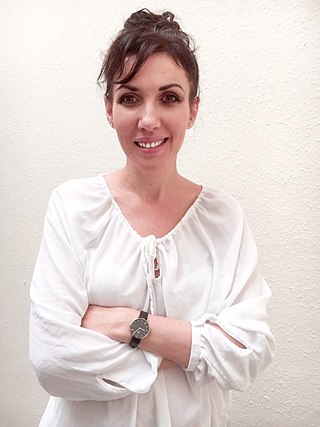Related Research Articles

Metaphysics is the branch of philosophy that studies the fundamental nature of reality, including the first principles of: being or existence, identity and change, space and time, cause and effect, necessity, and possibility.
Crispin James Garth Wright is a British philosopher, who has written on neo-Fregean (neo-logicist) philosophy of mathematics, Wittgenstein's later philosophy, and on issues related to truth, realism, cognitivism, skepticism, knowledge, and objectivity. He is Professor of Philosophical Research at the University of Stirling, and taught previously at the University of St Andrews, University of Aberdeen, New York University, Princeton University and University of Michigan.
Linda Trinkaus Zagzebski is an American philosopher. She is the Emerita George Lynn Cross Research Professor, as well as Emerita Kingfisher College Chair of the Philosophy of Religion and Ethics, at the University of Oklahoma. She writes in the areas of epistemology, philosophy of religion, and virtue theory.

Frank Cameron JacksonFBA is an Australian analytic philosopher and Emeritus Professor in the School of Philosophy at Australian National University (ANU) where he had spent most of the latter part of his career. His primary research interests include epistemology, metaphysics, meta-ethics and the philosophy of mind. In the latter field he is best known for the "Mary's room" knowledge argument, a thought experiment that is one of the most discussed challenges to physicalism.
Perdurantism or perdurance theory is a philosophical theory of persistence and identity. The debate over persistence currently involves three competing theories—one three-dimensionalist theory called "endurantism" and two four-dimensionalist theories called "perdurantism" and "exdurantism". For a perdurantist, all objects are considered to be four-dimensional worms and they make up the different regions of spacetime. It is a fusion of all the perdurant's instantaneous time slices compiled and blended into a complete mereological whole. Perdurantism posits that temporal parts alone are what ultimately change. Katherine Hawley in How Things Persist states that change is "the possession of different properties by different temporal parts of an object".

Gregory Paul Currie FAHA is a British philosopher and academic, known for his work on philosophical aesthetics and the philosophy of mind. Currie is Professor of Philosophy at the University of York and Executive Editor of Mind & Language.
Philosophy is the study of general and fundamental problems concerning matters such as existence, knowledge, values, reason, mind, and language. It is distinguished from other ways of addressing fundamental questions by being critical and generally systematic and by its reliance on rational argument. It involves logical analysis of language and clarification of the meaning of words and concepts.

Luciano Floridi is an Italian and British philosopher. He holds a double appointment as professor of philosophy and ethics of information at the University of Oxford, Oxford Internet Institute where is also Governing Body Fellow of Exeter College, Oxford, and as Professor of Sociology of Culture and Communication at the University of Bologna, Department of Legal Studies, where he is the director of the Centre for Digital Ethics. He is adjunct professor, Department of Economics, American University, Washington D.C. At the end of the academic year 2022-2023, Floridi will move to Yale, becoming the Founding Director of the institution’s Digital Ethics Center. He is married to the neuroscientist Anna Christina Nobre.

Myles Fredric Burnyeat was an English scholar of ancient philosophy.

Philosophy is the systematized study of general and fundamental questions, such as those concerning existence, reason, knowledge, values, mind, and language. Some sources claim the term was coined by Pythagoras, although this theory is disputed by some. Philosophical methods include questioning, critical discussion, rational argument, and systematic presentation.

Miranda Fricker, FBA FAAS is a British philosopher who is Professor of Philosophy at New York University, Co-Director of the New York Institute of Philosophy, and Honorary Professor at the University of Sheffield. Fricker coined the term epistemic injustice, the concept of an injustice done against someone "specifically in their capacity as a knower", and explored the concept in her 2007 book Epistemic Injustice.

Sally Haslanger is an American philosopher and professor. She is the Ford Professor of Philosophy in the Department of Linguistics and Philosophy at the Massachusetts Institute of Technology. She held the 2015 Spinoza Chair of Philosophy at the University of Amsterdam.
Susan James is a British professor of philosophy at Birkbeck College London. She has previously taught at the University of Connecticut and the University of Cambridge. She is well known for her work on the history of seventeenth and eighteenth century philosophy.

Jessica M. Wilson is an American professor of philosophy at the University of Toronto Scarborough. Her research focuses on metaphysics, especially on the metaphysics of science and mind, the epistemologies of skepticism, a priori deliberation, and necessity. Wilson was awarded the Lebowitz Prize for excellence in philosophical thought by Phi Beta Kappa in conjunction with the American Philosophical Association.
Gail Fine is a professor of philosophy emerita at Cornell University. She was also a visiting professor of ancient philosophy at Oxford University, and a senior research fellow at Merton College, Oxford University.
John Hyman is a British philosopher. He was Professor of Aesthetics at the University of Oxford before being appointed as Grote Professor of the Philosophy of Mind and Logic at University College London in September 2018.

The New York University Department of Philosophy is ranked 1st in the US and 1st in the English-speaking world as of the most recent edition of the Philosophical Gourmet Report from 2021. It is also ranked 1st in the world by the 2023 QS World University Rankings, and is internationally renowned. It has particular strengths in epistemology, history of philosophy, logic, metaphysics, moral and political philosophy, philosophy of language, philosophy of logic and philosophy of mathematics, and philosophy of mind. The department offers B.A., M.A., and Ph.D. degrees in philosophy, as well as a minor in philosophy and a joint major in language and mind with the NYU Departments of Linguistics and Psychology. It is home to the New York Institute of Philosophy, a research center that supports multi-year projects, public lectures, conferences, and workshops in the field, as well as outreach programs to teach New York City high school students interested in philosophy.
Sarah Jean Broadie was a British philosopher, a Professor of Moral Philosophy and Wardlaw Professor at the University of St Andrews. Broadie specialised in ancient philosophy, with a particular emphasis on Aristotle and Plato. Her work engages with metaphysics and both ancient and contemporary ethics. She has achieved numerous honours throughout her career as an academic philosopher. Broadie studied Greats at Somerville College, Oxford, graduating in 1960. Previously she has worked at the University of Edinburgh, University of Texas at Austin, Yale, Rutgers, and Princeton.
Elizabeth Barnes is an American philosopher working in feminist philosophy, metaphysics, social philosophy and ethics. Barnes is a professor of philosophy at the Corcoran Department of Philosophy, University of Virginia.

Mona Simion is a philosopher. She is professor of philosophy at the University of Glasgow where she is also deputy director of the COGITO Epistemology Research Centre. Simion's work focuses on issues in epistemology, ethics, the philosophy of language, and feminist philosophy.
References
- ↑ Weinberg, Justin (2021-04-28). "Katherine Hawley (1971-2021) (updated)". Daily Nous. Retrieved 2021-04-29.
- ↑ "Philosophy at St Andrews: Staff profiles". www.st-andrews.ac.uk. Retrieved 2016-11-28.
- ↑ "Professor Katherine Jane Hawley FRSE". The Royal Society of Edinburgh. 2020-03-24. Retrieved 2020-07-24.
- ↑ "RSE Honour for St Andrews academics". news.st-andrews.ac.uk. 2016-03-08. Retrieved 2020-07-24.
- ↑ "Katherine Jane Hawley - Activities and awards - University of St Andrews". risweb.st-andrews.ac.uk. Retrieved 2016-11-28.
- ↑ "Hawley, Katherine Jane". worldcat.org. Retrieved December 2, 2016.
- 1 2 3 "About". Katherine Hawley. 2015-02-27. Retrieved 2016-11-28.
- 1 2 "CV". Katherine Hawley. 2015-02-27. Retrieved 2016-11-28.
- 1 2 Dyke, Heather (2003-01-10). "Review of How Things Persist". Notre Dame Philosophical Reviews. ISSN 1538-1617.
- ↑ Krishnamurthy, Meena (2015-06-26). "Featured Philosop-her: Katherine Hawley". Philosopher. Retrieved 2016-11-28.